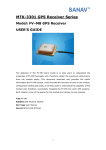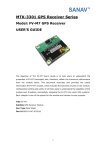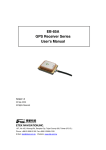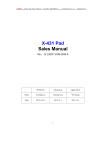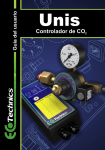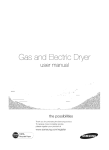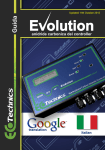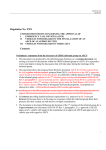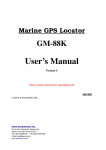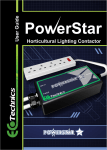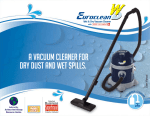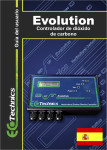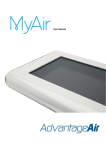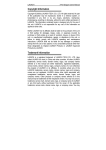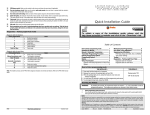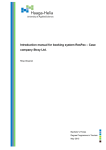Download 91. Aircon Comparison Aug 2011 newsletter.
Transcript
September 2011 Technical Newsletter Aircon comparison $4,990.00+gst Top seller of AECS It often seems very attractive to buy an on paper well-spec’d piece of equipment for a very low price directly from the internet or from a fly by night supplier. AECS distributes Ecotechnics (est 1995) aircon equipment which is manufactured in Italy. Wages in Italy are close to the wage levels in NZ, which is many times higher than what the average factory worker in for example China gets. To us, it seemed very attractive to start distributing cheaper aircon equipment to capture the low end of the aircon equipment market. During our search, we selected a prime manufacturer of aircon equipment in China. Being a prime manufacturer means that a company produces the equipment in its own factory. Many equipment manufacturers buy the equipment from prime manufacturers and simply put their stickers; logo‟s and mark up on these machines. We purchased and imported from this company the top of the line machine, which had a truly impressive specification list and was priced at about 2/3rd of a comparable Ecotechnics machine. X-431 Launch Diagun Scan Tool Features: Blue tooth & wireless technology Includes full set of connectors in its own carry case Touch screen & Colour pictures Greatly improved start-up speed Easy to install 24 month web upgrades at anytime Backed up with AECS technical support A greater coverage than most other tools! www.aecs.net I would like you to know that in all the following pictures we have made sure the logos and part numbers are not visible to protect the company, as the same machine is advertised in NZ with different colours. We prepared a comparison report to be sure that the machine would do what is needed in NZ workshops and would not create comebacks, which potentially leave a stain on AECS‟ reputation as a high quality equipment provider. Ecotechnics (Italy) Low cost Chinese Please make use of this comparison report and see what processes we apply before we distribute any type of equipment. Report If aircon has your interest, please read in detail the comparison report that we prepared User interface First, the front of the machine and the way the user interacts with the machine. Italian Ecotechnics Low cost Chinese User interface User interface ▬ ▬ ▬ ▬ ▬ ▬ ▬ ▬ ▬ ▬ ▬ ▬ The layout of the unit is clear. It has a 4-line LCD display. The menu structure is intuitive. The “high precision” software has built in waiting time during recovery and automatic vacuum leak check. The last 50 grams refrigerant charging is done in small steps to achieve high charge accuracy. The machine will automatically warn when a filter service is due. A fill quantity database is stored on-board and is USB updateable. The printer prints the used and recovered quantities of oil, refrigerant, and dye. It prints the diagnostic results and repair advice. It can do automatically flushing of the AC system. Robust taps can isolate the machine from the car. Clear analogue pressure gauges and electronic pressure and temperature gauges on the LCD. Hoses exit the machine from the front. ▬ ▬ ▬ ▬ ▬ ▬ ▬ ▬ ▬ The layout of the Chinese machine is also clear. The display is one line LCD. The menu structure is very simple due to its limited abilities. The machine does not have any waiting time. During recovery, it switches off at ambient pressure. Some refrigerant will only evaporate after a waiting period. It does not automatically continue into vacuum or charging mode. No service warning as there is no counter on board. No printer, the recovered and used volumes appear very briefly on screen and need to be written down. No taps between the machine and the hoses. Small pressure gauges, no electronic gauges, also no bottle pressure sensor. No charge quantity database. Service Step 1 - Recovery The first step when servicing an aircon system on a vehicle is to recover the refrigerant, filter it, dry it, separate the oil, weigh and store the refrigerant and measure the quantity of oil. On the Italian Ecotechnics machine the on board compressor removes the refrigerant from the car. The refrigerant flows through a filtration unit, an oil separator, a dryer, a distillation tower, another de-acidising filter, before the gas is compressed. The high-pressure gas is condensed before it is pumped into the storage bottle, which is placed on a weight sensor for quantity measuring, which is recorded by the controller. The oil is removed from the refrigerant and put into a storage bottle, which is suspended from a very sensitive weight sensor. The weight sensor reports to the Ecotechnics controller how much oil has been recovered. The Chinese machine also has a compressor, which removes refrigerant from the car. The refrigerant flows through an oil separator and through just one very small filter. The compressor increases the pressure of the gaseous refrigerant and pushes it directly into the on board storage bottle. No condenser is fitted, which makes the temperature and pressure in the on board bottle very high. Any compressor which needs to work in against high pressure becomes exponentially less effective. The fan fitted in the machine is supposed to cool the bottle (to reduce pressure) and to cool the compressor. The separated oil is pushed into a waste oil bottle, which has no weighing mechanism. The only way to measure, the oil is to look at the lines on the bottle. During recovery, the removal of refrigerant from the AC system cools the AC system down. The cold system reduces the speed at which the liquid refrigerant transforms into gas. The pressure can be pulled down by the compressor to -0.2 Bar (well under ambient) on the Italian machine and down to ambient pressure on the Chinese machine. The Italian machine will wait for a period at the end of recovery and monitors the pressure in the system. A certain pressure rise indicates that liquid refrigerant is still evaporating in the vehicle‟s AC system. The compressor will switch on again to recover the last remaining bit of R134a, before it automatically enters into the next stage (vacuum). If during the vacuum stage, the pressure suddenly rises to just over ambient the vacuum pump will switch off and the machine will indicate This IS special… We have achieved a major price wind back! Full kit $7090.52 + gst The ATS Scope has the following features: 1) 50Mhz Four ch or dual ch with generator 2) Approx 35,000 pre-recorded good patterns 3) Clear pictures showing how to hook up 4) Wiring diagrams and EFI tutorial 5) Save and share patterns (laptop/netbook) Easy to use; Concentrate on the vehicle! Not on: ‘how to use the tool’. A super level scope has never been so close within your reach! ATS 5000 (2 channel + signal generator) or ATS 5004d (4 channel differential scope) For a low $3,827.00+gst Expand your existing scope set (multichannel sw), build up a set, or buy a Start set $3,827.00 whole set for $7,090.52+ gst + gst Check out the spec‟s at www.aecs.net Many modern high tech options available, like ~ G sensor, ~ pressure sensor, ~ return flow sensor, ~ AC pressure sensor. ~ Expandable to more channels Check out our web catalogue, this is a very special deal !! Call us at 06 874 9077 or, visit: that refrigerant is still present in the system which needs to be recovered. The Chinese machine‟s compressor will switch off when just ambient pressure has been achieved and that‟s it. Even a substantial pressure rise does not restart the compressor. The display indicates that the vacuum pump needs to be activated to continue. This requires user intervention (labour). If any refrigerant is present in the AC system during the vacuum cycle, it will be expelled to atmosphere by the vacuum pump. If liquid refrigerant is still present, it will destroy the vacuum pump as there is no safety. The machine can also be switched into vacuum mode when the AC system is still fully charged. We stripped the newly purchased Chinese machine and a new Ecotechnics (Italian) machine to inspect how each machine achieves the recovery process. Italian Low cost Chinese Service step 2 - Vacuum After the refrigerant has been recovered and stored, the AC system needs to be vacuumised with a vacuum pump. The vacuum process removes any air, moisture, and remaining refrigerant from the AC system. No vacuum pump is able to remove moisture from the vehicle AC system‟s desiccant in the receiver dryer. Also is it not able to remove liquid (oil) or particulates (filings, dirt,etc) from the AC system. The vacuum pump can only remove vapour. The vacuum time needs to be long enough to allow for example water to turn into vapour so it can be removed. For this reason the vacuum time for an average car is around 30 minutes. The vacuum time can be adjusted to cater for individual conditions, on both machines. The vacuum pump will be on continuously during the vacuum time, so it needs to be robust. It needs to have a high precision pump for achieving the lowest possible vacuum, to speed up the transformation process of water turning into vapour. The refrigerant is pulled through the filtration/ distillation/ separation unit, compressed, and condensed, before it is pumped into the storage bottle. The waste oil is pumped into the waste oil bottle for inspection and measuring. The refrigerant is pulled through an oil separator and 1 filter before it is compressed and pushed directly into the storage bottle. The separated oil flows into the waste oil bottle. Italian Low cost Chinese The Italian machine will automatically isolate the vehicle from the running vacuum pump after ten minutes. During 60 seconds the control unit monitors the pressure. A pressure increase indicates a likely leak in the system and the Ecotechnics machine will sound an alarm and stop the vacuum process. When no leak is found the software progresses to the next stages, deep vacuum, oil (+UV) fill and refrigerant charging. During the vacuum process a heater increases the pressure in the on board storage bottle to speed up refrigerant charging. The vacuum pump is large and robust. The Chinese machine will turn the very small and fragile looking vacuum pump on for a pre-set duration. The timer does not interrupt when for example a vacuum leak is present in the AC system The separated oil gets stored in a waste oil bottle. The weight increase on the sensor is a measure of quantity. Italian Low cost Chinese The vacuum pump is large and robust in the Italian machine, and is controlled by smart electronics. The small vacuum pump is switched on and off without any control other than a timer. The separated oil is pushed into a waste oil bottle; the quantity is measured by looking at the deviations on the bottle. Service step 3 - Charging When the recovery and vacuum process is complete the vehicle‟s AC system needs to be topped up with new oil and charged with refrigerant. Oil charging The oil needs to be drawn into the AC system by the vacuum created by service in step2. The oil will enter the hoses connected to the car and will be flushed into the AC system by the refrigerant filling procedure. The oil quantity needs to be precisely measured as the AC system does not have an oil level gauge. The oil which comes out during recovery (waste oil), needs to be measured and the new oil that needs to replace the extracted oil needs to be measured accurately too. The Italian machine will automatically shut a solenoid valve when the correct quantity of oil has been entered the vehicle‟s AC system. On the Chinese machine a button on the front of the machine needs to be pushed while looking at the deviations on the new oil bottle (off the side of the machine). When the correct amount of oil has been drawn out of the bottle you need to let go of the button. Italian The new oil is stored in a new oil bottle. The weight decrease on the weight sensor is a measure of the oil quantity injected in the car‟s AC system. VTEQ (made in Spain) is a long established brake tester manuf. producing equipment for distributors all over the world, including AECS Ltd in NZ. 2080 analogue brake tester. We have installed NZ install done by AECS Ltd machines throughout New Zealand, prices ranging for small workshops to large dealerships. The VTEQ 2000 analogue brake tester at $17,000 (+gst, installed, but excl.work on building) The 3080 Suspension and brakes inspection test lane at $32,000 +gst. The 3080 (and 2080) has a testing ability of up to 6 ton axle weight and can test shocks and alignment in one drive through. Quick, sturdy and reliable! 3080 digital testlane, NZ install done by AECS Ltd Sales, Installation and training by AECS Ltd Check our catalogue for specifications at: www.aecs.net Ph: 06 8749 077 Low cost Chinese The new oil is sucked into the service hoses, from the new oil bottle. The oil quantity is measured by looking at the deviations on the bottle. Refrigerant charging The pressure difference between the vacuum in the vehicle‟s AC system and the refrigerant pressure in the machine‟s storage bottle makes refrigerant flow into the car‟s AC system. The quantity charged in the car, needs to be precisely measured as an under and overcharged AC system runs inefficient, in almost all cases cooling the cabin air less and increasing the vehicle‟s fuel consumption. The quantity measuring is done by the machine, with a weight sensor under its storage bottle. The Italian machine‟s control unit automatically measures the weight of the bottle before charging begins. It also turns automatically the heater on to increase the bottle pressure. The AC charge quantity is selected from an on board database by selecting the vehicle type and model, at the start of the service process. The solenoids will shut approximately 50 grams before the correct charge quantity has flowed from the storage tank. The solenoids will open in short bursts to precisely add more refrigerant till the correct quantity of refrigerant has been taken out of the machine‟s bottle. When the correct weight has been reached, the control unit will instruct the user, on the display, how to get the remaining refrigerant from the machine‟s hoses into the AC system. This results in a very precise charge into the vehicle, something which needs to be considered when working on for example 200 gram systems (total charge on some late model BMW‟s) with only 5 gram allowable deviation! The Chinese machine will show a zero weight during charging and opens the solenoids till the manually entered weight (weight reduction of the bottle) has been reached. The solenoids will shut and procedure is regarded as completed. This method is very imprecise. We had about 100 gram difference in weight during different recover/ recharge cycles of 1000 gram refrigerant in a service tank. The Chinese machine does not have a heater blanket to increase the bottle pressure during charging making the process very slow. Italian Low cost Chinese This air needs to be removed as else the pressure in the tank will keep rising, stopping the compressor from pushing refrigerant into the tank, damaging the compressor. The Italian machine compares the bottle pressure with the bottle temperature and decides based on that logic if air is present in the storage tank. The control unit in the machine will sound a warning and will open automatically a solenoid valve to vent the air. This venting is called purging. The Chinese machine does not have any provision to purge the tank. There is no connection on the bottle for a purge valve. This leads me to conclude that any air in the bottle will eventually be charged back into a car, but we have not tested this. Italian The storage tank is temperature/pressure checked for the presence of e.g. air. The tank has a heater blanket for increased charging pressure. Low cost Chinese The storage tank has no temp. sensor or heater mechanism. The weight sensor has no transport safety device. Both machines need to be able to be transported across rough areas, or need to be able to be used in mobile applications. For this purpose is the Italian machine equipped with a transport lock bolt. The Chinese machine does not have this transport provision. Purging With AC servicing it is very likely that air or other „high pressure condensable gasses‟ enter the storage tank. AECS Equipment Standard Features: Weight scales Recovery compressor The storage tank has a purge connection. The purge line is connected to the valve body for automatic purging. No purge connection on the bottle. Ph:+64 (6) 874-9077 www.aecs.net We also supply other models of High quality Ecotechnics Air-conditioning machines, details can be found on our website www.aecs.net Vacuum pump On board storage bottle Build in manifold, with automatic solenoid valves. Oil separation + injection Charge quantity database Standard price is $7916 + GST. Automatic flushing software USB Port for updating Serviced on your premises! PLUS ...AECS technical support. Profit from our bulk buying Consider this beautiful quality Italian made Air-conditioning machine! User manual In most cases a small user‟s manual is a good thing or else it will not be read. The Italian machine has an elaborate and clear user‟s manual. The manual explains step by step every option the machine has. It does not explain where certain functions are used for. The user‟s manual is not an “how to service AC systems” training manual. The Chinese machine has a very short to the point manual. It does also not explain how the system works, just which button to push and what you should read on the display. Conclusion We have been lucky to be able to put both machines through a series of side by side tests and pull both machines apart with an objective mind. Something most garages or aircon specialists cannot afford to do. Both machines require a certain level of expertise to be able to operate effectively. With the Chinese machine a far greater AC system understanding is required to prevent errors like damaging the vacuum pump, charging air into the car, discharging refrigerant into the atmosphere. Prevention of over or under charging the vehicle is not possible. The Italian machine has a control unit (software operated), so has far more safety and logic build in. Safety for the operator, the vehicle, and the recovery/recycle machine itself. Also the difference in overall engineering quality and precision adds to the equation. AECS has decided NOT to market this particular high spec‟ed low cost Chinese brand, even though it has an attractive price and exterior. Any garage or aircon service shop who wishes to invest in a recover/recycle machine needs to consider all aspects of that purchase, including training and back up. For AECS Ltd: H.P. Leijen (trainer/research) E-Mail: [email protected] AECS TRAINING AED Automotive Electronic Diagnostics 13th & 14th September 2011- NELSON 1st & 2nd November 2011 - AUCKLAND SCAN 1-1 Scan tool Diagnostics 16th & 17th September 2011 - GREYMOUTH 19 & 20th September 2011- CHRISTCHURCH ECAC1-1 Air conditioning 1-1 21st & 22nd September 2011 CHRISTCHURCH EMS1-4 Hybrid Engine Management 3rd & 4th November 2011 AUCKLAND Ring us today to enrol Courses that are current with today’s Technology Ph:+64 (6) 874 9077 Further course information on our website www.aecs.net Did you know……? We are sending out a training plan survey in the next few weeks to you. This is your chance to get the training you want in your area as it will help us to plan 2012 training calendar. The survey will be emailed to you including a special offer for selected training seminars.







